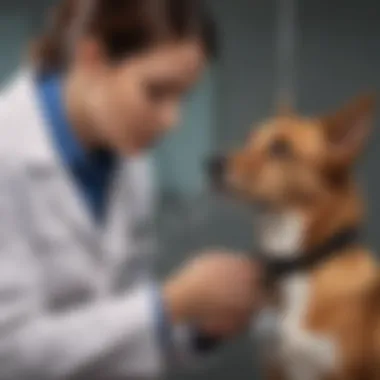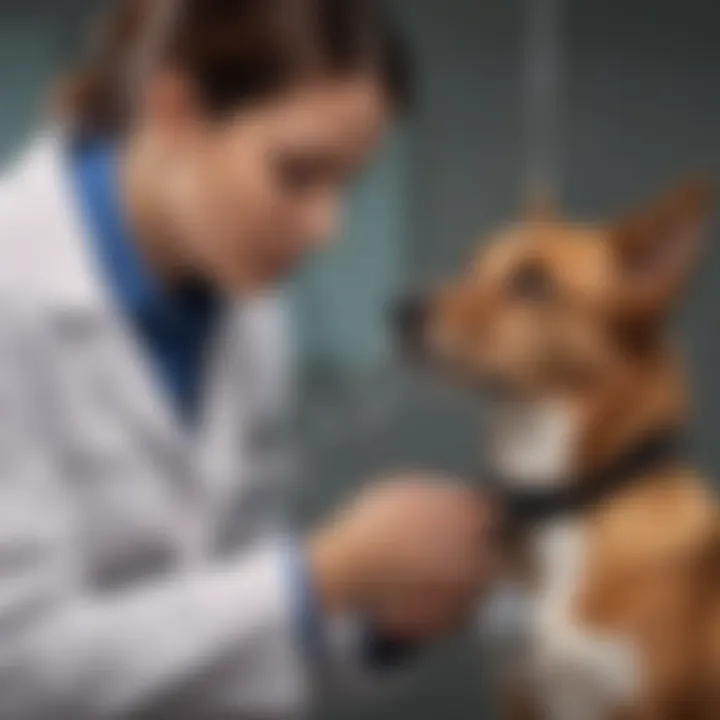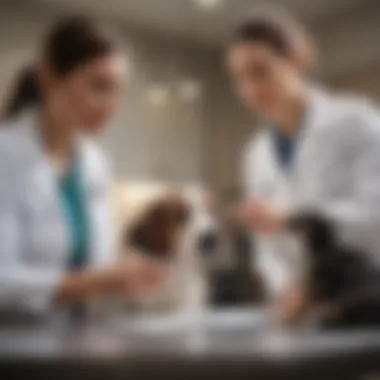Essential Skills for Aspiring Veterinarians


Intro
Becoming a veterinarian is a journey filled with compassion, diligence, and a commitment to the well-being of animals. This article will illuminate the critical skills aspiring veterinarians require beyond clinical expertise. Technical knowledge in animal medicine is crucial, but so are interpersonal and business skills in running a successful practice. By investigating these facets, we will equip young professionals and students with a clearer understanding of their career paths in veterinary medicine.
Overview of Core Skills
Technical Proficiency
Veterinarians must possess in-depth knowledge of animal biology, anatomy, and physiology. They diagnose and treat numerous health conditions and are responsible for conducting surgeries when necessary.
Communication Abilities
The importance of exceptional communication is not to be understated. A veterinarian must efficaciously engage with pet owners, colleagues, and support staff. They should translate complex medical jargon into understandable terms for clients, fostering trust and ensuring adherence to treatment plans.
Empathy and Compassion
A redeeming quality of a veterinary doctor lies not just in technical succession but in the ability to empathize. They need to understand the emotions of both animals and human owners. This emotional intelligence is essential, especially when delivering bad news.
Business Acumen
Veterinarians often manage their practices. Consequently, a degree of business sense is necessary. This includes familiarity with financial management, marketing, and client relations. Understanding the economic aspects helps sustain a veterinary practice.
Key Point: The varied skill set makes veterinarians more effective and enhances their career prospects.
Continuous Learning Aptitude
Veterinary medicine is always evolving. Professionals must engage in lifelong learning through continuing education programs, workshops, and seminars to stay current with advancements in veterinary science. Without this commitment, a veterinarian may fall behind.
Epilogue
The profession of veterinary medicine calls for a unique combination of technical and interpersonal skills. Future veterinarians should cultivate these abilities actively throughout their careers. By understanding what is truly required to succeed, they can make informed choices and propel their journey forward with clarity and purpose.
Prelude to Veterinary Medicine
Veterinary medicine is a vital field that plays a crucial role in public health, animal welfare, and the understanding of zoonotic diseases. The growing human-animal bond elevates the significance of veterinarians not only as healthcare providers but also as educators and advocates for animal welfare. Understanding the intricacies of this profession is essential for those aspiring to enter the field.
The Role of Veterinarians
Veterinarians are trained professionals who diagnose and treat animals. Their responsibilities encompass a variety of tasks, including performing surgeries, conducting exams, and administering vaccines. Furthermore, they often educate pet owners on various matters such as proper animal care and nutrition. Veterinarians must also be forwal guardians of animal welfare, ensuring that animals receive humane treatment.
A veterinarian's work often extends beyond individual pet care, influencing public health through monitoring animal diseases and their potential impacts on humans. Their role can vary significantly depending on whether they work in general practice, emergency care, or research.
The Importance of Skill Development
Skill development is not a one-time initiative but a continuous process that underpins the viablity of a successful veterinary career. Aspiring veterinarians must pursue a diverse range of skills. Not only must they build technical abilities related to animal care, but they also need interpersonal skills to communicate effectively with pet owners and other veterinary staff. The ability to cultivate strong relationships with clients is equally important as technical competence.
Investing in skill development where both hard and soft skills are prioritized leads to enhanced job satisfaction and improved patient outcomes. Here are several areas where skill development is vital:
- Clinical Skills: Knowledge of medical and surgical procedures.
- Communication Skills: Ability to explain diagnoses and treatment plans.
- Critical Thinking: Analyzing complex cases and making quick decisions.
"Veterinary medicine requires not just knowledge but the continuous honing of skills to adapt as the field evolves."
In summary, understanding the essential role of veterinarians in society frames why skill development is paramount. Those who seek to become veterinarians must embrace a lifelong commitment to learning and improving their abilities, ultimately enhancing both animal health and the profession itself.
Foundational Knowledge
Foundational knowledge is crucial for anyone looking to pursue a career in veterinary medicine. It serves as the bedrock upon which all other skills are built. Without it, veterinarians would lack the necessary insight to diagnose and treat diverse medical conditions in animals. A solid grasp of animal anatomy and physiology is essential to understand how the body functions, enabling the identification of abnormalities when they occur. This is more than just academic knowledge; it can lead to better patient care and improves the decision-making process.
Aspects such as proper interpretatiion of medical terms also play a vital role. Veterinary professionals rely on specific terminology to articulate health issues, engage with peers, and communicate effectively with clients. Skill in these areas not only boosts confidence but lays the groundwork for the technical and interpersonal skills required in the diverse activities faced by veterinarians.
Understanding Animal Anatomy and Physiology
Animal anatomy and physiology is possibly the most critical section of foundational knowledge for veterinerians. This domain involves studying the structure of the animal body and the functions that underpin its operations. This knowledge not only applies to domestic pets but skyscraper s to a variety of species. For instance, veterinarians are expected to understand the unique muscular and skeletal systems found in different animals, from dogs and cats to birds and reptiles.
Gaining insights into these systems helps in diagnosing illnesses using palpation, listening to heartbeats, or observing behavioral changes. Noticeәble conditions or signs often relate directly to changes in internal processes. Familiarity with disease processes and how they influence anatomy is essential.


Moreover, their education should cover physiology, helping veterinarians recognize how stress or other external enviroments mases effects health and well-being. Understanding chemistry patient responses is also crucial for administering treatments and making clinical decision.
Familiarity with Medical Terms
A veterinarian adept at understanding medical terminology can effectively communicate with clients and colleagues. Each term contains critical information that can lead directly to course of action in practical apply. Knowledge fixtures precision in documentation and eases fluid discussions regarding treatment or symptoms between medical staff. Facts about medications, procedures, and diagnoses are better conveyed with proper terminology.
Considering there are various body systems – such as the cardiovascular system or the Krebs cycle of metabolism – clear definitions help clarify the veterinarian's role in animal health care. A lack of familiarity with a set terminology can lead to miscommunication, resulting in potential misunderstandings that could adversely affect treatment outcomes.
To summarize:
- Understanding terminology leads to effective communication.
- Precision enhances client trust in the practice's expertise.
- Clarity aids diagnostics and allows for reassurance in animal care.
Overall, solid foundational knowledge including effective application enhances the quality of veterinary practices and foundational enablement provides the understanding necessary for continued learning.
Technical Skills
Technical skills form the core competencies required to practice veterinary medicine effectively. They encompass a variety of abilities that veterinarians must develop to diagnose and treat animal ailments with precision. In this section, we will explore three key areas of technical expertise that are indispensable for aspiring veterinarians: diagnostic proficiency, surgical skills, and administering treatments.
Diagnostic Proficiency
Diagnostic proficiency is the ability to assess and determine the medical conditions of animals accurately. This skill is vital because correct diagnoses directly influence treatment plans and outcomes. A veterinarian's responsibility involves gathering thorough medical histories, conducting physical examinations, and interpreting laboratory tests. Mastery in these areas leads to improved patient health and enhanced client trust.
Some important elements of diagnostic proficiency include:
- Observation Skills: Toughens with practice. A good observer notes minor changes in behavior or physical condition.
- Critical Thinking: Analyzing multiple sources of information is crucial for accurate assessment. It ensures consideration of various potential conditions.
- Using Diagnostic Tools: Becoming adept with tools such as blood analyzers, x-ray machines, and ultrasound equipment mean that veterinarians become more effective. Each tool presents its challenges and learning them can significantly impact diagnosis.
The importance of honing these skills cannot be overstated. Ultimately, a veterinarian’s ability to efficiently identify an issue determines the level and urgency of care they can deliver.
Surgical Skills
Surgical skills hold substantial weight in the spectrum of what veterinarians must master. Many medical conditions require surgical intervention ranging from routine procedures such as spaying and neutering to more complex surgeries like orthopedic corrections. Competence in this area ensures safety and effectiveness during such procedures.
This subspecialty draws upon the hours of extensive training. It impacts the result of surgeries and the overall health of the animal. While precision in the operating theater is necessary, so too is the ability to discuss what a procedure entails with pet owners. This fosters trust and padds their anxiety.
Some key aspects of surgical skills involve:
- Anatomical Knowledge: Understanding animal anatomy which is crucial for any surgical procedure planned. Any gap can lead to unintentional harm.
- Hand-Eye Coordination: Is essential during surgery. Practicing techniques in time allows hands to become as skilled as eyes.
- Emergencies Handling: Surgeons must be ready for unexpected events during procedures caused by anatomical abnormalities or reactions to anesthesia. Training in this area reduces potential risks.
Veterinarians succeed when they marry surgical knowledge with practical experience, thus fostering a safe environment for both animals and pet owners.
Administering Treatments
Administering treatments is where one can see technical skills interfacing with compassion. It involves distributing medications, administering vaccines, or providing therapies e.g. physical therapy to support the recovery process. The application requirements can differ based on species, health condition, and treatment type.
Veterinarians must weigh precisely how each medication forms an integral part of the treatment plan. This skill involves understanding dosages correctly, timing for administration, and routes of delivery, be they oral, injectable, or topical.
Consider the following aspects:
- Pharmacology: Have a foundational understanding of important drugs. A misjudgment can lead to dire consequences.
- Client Overlook: Effective transitions with owners encourages compliance with follow-ups and medication routines.
- Record Keeping: Monitoring the history of treatments can alleviate problems while providing clear paths forward in future cases.
Veterinary techniques in administering treatment denote nuanced skills, but successfully executing only amplifies the rehabilitation and health of the animals under their care.
Correct technical skills are vital. In surgeries or treatments, a slight mistake carries serious implications for patient well-being.
Technical skills range from diagnosis and planning to treatment execution. These abilities underpin the responsibilities of being a veterinarian, where practical experience combined with theoretical knowledge forms the basis of effective animal care.
Interpersonal Skills
Interpersonal skills are essential for veterinarians, as they directly impact client relationships and care delivery. These skills are much more than just communication; they encompass the ability to understand emotions, foster collaboration, and engage in meaningful interactions. As veterinarians often deal with both animals and pet owners, developing these skills is vital for clarity in discussions and for providing comfort to pet owners during challenging times.
Communication with Pet Owners
Effective communication with pet owners is critical. This involves the clear relay of information regarding an animal's health, treatment options, and preventive measures. When veterinarians communicate complex medical information simply and understandably, they help pet owners feel empowered to make informed decisions for their pets.
- Practicing Active Listening: To truly understand a pet owner’s concerns, veterinarians must listen without interrupting. This demonstrates respect and helps gather important details that can affect a pet’s well-being.
- Clear Language: Using jargon-free language is key. Pet owners may not have a medical background, so simplification without losing accuracy is important.
- Non-verbal Cues: Body language and facial expressions should match the verbal message. A calm tone and open demeanor can cultivate trust, while signs of impatience can discourage open communication.
Collaboration with Veterinary Staff


Collaboration with the veterinary team is another critical facet of interpersonal skills. A as a veterinarian, you work closely with veterinary technicians, assistants, and receptionists. Each team member plays an important role in delivering comprehensive animal care.
- Team Meetings: Regular discussions amongst staff can improve the flow of information and foster a supportive environment.
- Delegation of Tasks: Understanding the strengths and weaknesses of team members allows for effective task delegation. This maximizes efficiency and maintains high standards of care.
- Conflict Resolution: Misunderstandings can occur in a team setting. Addressing issues directly but tactfully is essential to maintain a professional environment.
Empathy and Compassion
Empathy and compassion are cornerstones of delivering veterinary care. They are not only vital for effective animal care but also for client relations. Understanding what pet owners feel is key to guiding them through the emotional aspects of pet care.
- Emotional Support: Animals cannot articulate their pains or needs, which can be overwhelming for owners. Providing compassionate support helps ease their fears and builds rapport.
- Seeing through the Owner’s Eyes: Understanding the emotional bond between a pet and its owner enables veterinarians to offer tailored support during consultations and treatments. Such an approach reassures owners that their feelings are acknowledged.
- Follow-up Communication: After treatment, reaching out to pet owners shows that the veterinarian cares about their experience and their pet’s recovery. This further solidifies a strong bond with owners, fostering loyalty.
In veterinary medicine, fostering strong communication and relationships with clients and coworkers will tremendously enhance a veterinarian’s capability to perform their duties effectively.
Critical Thinking and Problem Solving
Critical thinking and problem-solving are essential skills for veterinarians. These abilities enable professionals to make informed and effective decisions in real-time situations that can significantly impact animal health and welfare. Since veterinarians often deal with complex medical cases, being able to think critically and analyze scenarios thoroughly can greatly benefit both animals and their owners.
Analyzing Clinical Cases
In the veterinary field, analyzing clinical cases involves evaluating various medical information and symptoms presented by a patient. Veternarians must actively observe each detail, from the animal’s behavior to laboratory findings. This process often begins with gathering a comprehensive history from the pet owner. Every piece of information gathered can lead to potential explanations for the condition observed.
maresJe gennemásing the patient’s medical records, along with physical examinations, can signal potential issues.
Also, problem-solving techniques such as narrowing down possible diagnoses facilitates finding the underlying cause of discomfort. The knowledge gained from foundational studies in veterinary medicine significantly aids veterinarians in this step.
Possible Case Analysis Steps:
- Gathering history and symptoms reported by pet owners.
- Conducting a physical examination utilizing skills developed through training.
- Testing using laboratory diagnostics as needed.
- Consulting advanced diagnostic tools, such as imaging.
- Putting together the information based on evidence, seeking further clarification when needed.
Practitioners often find themselves assembling variousp ciles throgh utilization of critical analysis. This comprehensive understanding helps propose effective treatment options or medical interventions. Also, issues can arasae when observations made do not align perfectly is diagnosed.
Making Informed Decisions
When it comes to making informed decisions, veterinarians must weigh the available information against potential outcomes. Makin rational choices in a clinical environment can mean the livves of animals are getting impacted positively. The professional often employs a blend of their personal experience, scientific reasoning, and input from peers.
Decision-making is multi-layered, and the intensity of it increases when concerning acute or life-threatening situations. Therefore, veterinarians constantly modify their strategies based on real-time feedback received to enhance patient care. It is beneficial to keep ethical principles of medical practice in mind, which applies pressure to iterate each potential solution effectively.
Some critical points in making informed decisions include:
- Evaluating treatment feasibility based on comprehensive case analysis.
- Considering the Owner’s perspective and likely consequences for themselves and their pet.
- Reviewing latest research, best practices, and veterinarian guidelines.
- Reflecting on past cases and which strategies worked or failed previously.
Understanding the significant impact of critical analysis in veterinary medicine cannot be overstated. The ability to practically apply critical thinking shapes successful outcomes for both veterinarian and patient alike.
Business Skills
In the realm of veterinary medicine, possessing strong business skills is often overlooked. However, these skills are vital to establish and run a successful veterinary practice. The increasing complexity of animal healthcare systems necessitates that veterinarians not only provide excellent medical care but also manage business operations effectively. This dual role brings a distinct set of challenges that require focused business acumen.
Understanding Veterinary Economics
Veterinary economics can significantly impact a practice’s sustainability and growth. It involves understanding the financial aspects of running a practice, including costs associated with animal care, pricing of services, and revenue generation. Each veterinary practice must analyze its economic model to ensure it operates profitably.
Various trends, such as the increasing cost of supplies and rising client demands, underline the importance of a solid financial foundation. Additionally, comprehending market forces within the locality can help veterinarians adjust their strategies accordingly. This nuanced understanding of supply and demand in veterinary medicine allows veterinarians to set appropriate fees while ensuring that quality care remains accessible.
Veterinary economics includes budgeting for things like:
- Staffing and training costs
- Maintenance and equipment needs
- Marketing expenses
Moreover, a grasp of economic principles can guide veterinarians to make informed choices regarding investments, which ultimately affects the quality and scope of services they can offer.
Management of Veterinary Practice
Managerial skills are equally important in veterinary medicine. Establishing a successful practice involves navigating daily operations efficiently. This includes managing staff, maintaining client relationships, and overseeing the finances discussed earlier.
A veterinarian with strong management skills can inspire their team. They can set clear expectations, provide constructive feedback, and streamline workflows. Effective communication within the staff fosters a positive work environment. Moreover, well-managed practices often lead to better patient outcomes and client satisfaction.
Key components of managing a veterinary practice include:
- Developing efficient practice protocols
- Tracking financial performance regularly
- Engaging with clients to build long-term relationships


Veterinarians must also stay adaptable. Changes in regulation, technology, or emerging health threats can affect how a practice needs to operate. But with solid management skills, adjustments become smoother. In essence, mastering these business skills equips veterinarians to not only survive but thrive in their careers.
“Understanding the financial landscape of your practice can mean the difference between a vibrant clinic and one that is struggling to stay afloat.”
Continuous Education and Specialization
Continuous education and specialization are critical in the field of veterinary medicine. As this discipline evolves, new technologies and approaches become available. For veterinarians, engaging in continuous learning is not just beneficial; it is a necessity. This commitment ensures that they remain informed and competitive. It allows them to provide the highest standard of care to animals.
Keeping Up with Veterinary Innovations
The veterinary field is constantly changing due to advances in sciences and technology. New vaccines, treatments, and diagnostic tools are regularly introduced. It is essential for veterinarians to stay current with these innovations. Ongoing professional development through workshops, conferences, and courses can aid in this. Finding reliable sources of information is necessary to remain up-to-date, like veterinary journals or online courses, for instance.
- Professional Associations: Joining organizations like the American Veterinary Medical Association can be thoughful. They offer resources, updates on new practices, and networking opportunities.
- Continual Assessment of Skills: Evaluate current knowledge skills periodically. Understanding one’s weaknesses can trigger targeted continuous education strategies.
By engaging with emerging techniques and relevant research, vets can enhance their service delivery effectively.
The Role of Specializations in Veterinary Medicine
Specialization is vital within veterinary medicine. While general veterinarians can treat a wide range of animals, specialists focus on specific fields such as dermatology, surgery, or internal medicine. Choosing a specialization can lead to several benefits.
- Deepen Knowledge: Through specialized training and experience, professionals can gain significantly deeper knowledge in a specific area. This provides the ability to diagnose and treat cases that require advanced expertise.
- Impact Quality of Care: With knowledge gained through specialization, a veterinarian can improve overall animal care outcomes. Specialized veterinarians may resort to more sophisticated procedures and techniques that general vets may not perform.
- Professional Satisfaction: Working within a preferred area can enhance job satisfaction. Festive fellings often improve when the veterinarian's passion aligns with their daily responsibilities.
Investing in education and specialization yields dividends, ensuring that veterinarians adapt and thrive in a rapidly changing industry.
Ethical Considerations
Veterinary ethics play a crucial role in veterinary medicine. As veterinarians navigate complex decisions regarding patient care, they must uphold the standards of ethical practice. The weight of this ethical framework lies both in the treatment of animals and in the interactions with pet owners and society. Knowing what is right and wrong inform every action a veterinarian takes, underscoring the significance of careful consideration in their daily operations.
Understanding Veterinary Ethics
In the realm of veterinary medicine, ethics governs how veterinarians engage with their patients, clients, and the broader community. Ethical principles challenge veterinarians to prioritize the health of animals and humans alike. This involves understanding and adhering to established directives from organizations like the American Veterinary Medical Association (AVMA). Key elements of veterinary ethics include:
- Beneficence: Act in the best interests of animals.
- Non-maleficence: Avoid causing harm.
- Ownership and Financial Aspects: Maintain clear communication about care costs and procedures to pet owners.
- Professionalism: Uphold a standard of practice that reflects integrity and competence.
By internalizing these principles, aspiring veterinarians can create a practice environment that reflects respect and responsibility towards their patients and their guardians.
Ethics serve as a constant reminder that veterinarians are stewards of animals’ welfare, balancing diverse needs each day.
Animal Welfare and Advocacy
Animal welfare emerges as an essential concern alongside the practice of veterinary medicine. This extends the veterinary profession’s role into advocacy, bringing a focus on improving the quality of life for various species. Responsibilities towards animal welfare include:
- Holistic Treatment Plans: Beyond clinical care, assess animals’ mental and emotional well-being.
- Education: Teach pet owners about responsible animal care and husbandry practices.
- Promotion of Best Practices: Engage in legislative processes advocating for animal rights and welfare.
- Research: Conduct studies to understand better the needs and care of various species.
Veterinarians carry the responsibility of advocating for those who cannot speak for themselves. Their expertise is not simply for diagnosing and treating. It lies also in working alongside communities to raise awareness about issues affecting animal populations today.
Closure
In this examination of essential skills required to be a veterinarian, we see a detailed map of the necessary competencies that define this vocation. The role goes far beyond just treating animals. A veterinarian needs technical skills like understanding anatomy, proficiency in diagnostic procedures, and surgical capabilities. These operating skills are foundational.
Equally critical are the interpersonal skills. They shape the interactions vets have with pet owners and colleagues. Compassion and communication ensure that clients feel understood, fostering trust and loyalty. Additionally, understanding the nuances of managing a practice is vital. This includes everything from basic veterinary economics to direct client management skills.
A successful veterinarian combines scientific knowledge, emotional intelligence, and business acumen to thrive in a competitive field.
Moving beyond specific skills, two overarching ideas stand out: the need for continual education and embracing ethical considerations. As veterinary medicine advances, ongoing training is non-negotiable. Likewise, being well-versed in veterinary ethics ensures accountability and reflects a commitment to animal welfare.
In essence, excelling as a veterinarian means delivering high-quality care while upholding ethical standards, communicating with precision, and skillfully managing practice operations. By fostering a skill set encompassing these areas, aspiring vets are better equipped to provide excellent service.
Recap of Essential Skills
As we summarize the essential skills outlined, it is clear that a successful veterinary career demands a multidimensional approach. Key areas include:
- Technical Skills: Mastery of animal anatomy and diagnostic practices is fundamental.
- Surgical Proficiency: Expertise in surgical techniques can be pivotal in offices or clinics.
- Interpersonal Skills: Clear communication, empathy, and collaboration ensure effective patient care and client relationships.
- Business Acumen: Understanding economic principles governing the veterinary landscape can impact overall success.
- Commitment to Ethical Practice: Upholding veterinary ethics not only enriches the profession but also assures public trust.
Together, these skills create a robust framework for navigating the complexities of veterinary medicine, rendering each practitioner capable and prepared for the challenges ahead.
The Path Forward for Aspiring Veterinarians
The journey toward becoming a proficient veterinarian requires intentionality and preparation. Crucial steps include:
- Educational Background: Obtaining a degree in veterinary medicine. Seek programs recognized for their comprehensive curriculum.
- Practical Experience: Engage in internships and externships during education. Hands-on experience solidifies knowledge and builds confidence.
- Networking: Building connections with experienced veterinarians and professionals fosters support and mentorship.
- Continued Learning: Stay updated on advancements in veterinary medicine and emergent research through workshops, professional organizations, etc.
- Personal Development: Engaging in resources that improve emotional intelligence and ethics fundamentally shifts professional interactions.
By recognizing the value in each area, aspiring veterinarians can not only deepen their insight but also prepare themselves to become indispensable in a field that grows ever more challenging and demanding. The investment in these skills will bear fruit in your career and the well-being of the animals you care for.







